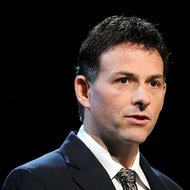 Jonathan Fickies/Bloomberg NewsDavid Einhorn, the head of the hedge fund Greenlight Capital.
Jonathan Fickies/Bloomberg NewsDavid Einhorn, the head of the hedge fund Greenlight Capital.
8:43 p.m. | Updated
The prominent money manager David Einhorn and his hedge fund, Greenlight Capital, were fined about $11 million by Britain’s financial regulator on Wednesday for using confidential information to trade in the stock of a British pub chain.
The Financial Services Authority of Britain penalized Mr. Einhorn for selling shares in Punch Taverns shortly after learning that the company was considering a large stock sale, a move that would be expected to drive down a company’s share price.
Mr. Einhorn denied any wrongdoing, and in an hourlong conference call with his investors and the media on Wednesday afternoon, he denounced the regulator, which has vowed to take a tougher stance on white-collar crime.
“This resembles insider dealing the way that soccer resembles football,” said Mr. Einhorn, who delivered 40 minutes of prepared remarks on the call. He described the regulator’s case as “something more akin to a traffic cop with a quota at the end of the month and a miscalibrated radar gun.”
The regulator’s civil penalty is a setback for Mr. Einhorn, whose Greenlight hedge fund manages about $8 billion in assets. And his unusual rebuke of a regulatory authority is just the latest public episode in the money manager’s colorful career. Unlike many of his peers who try to remain below the radar, Mr. Einhorn has carved out one of the most public faces and opinionated voices in the hedge-fund industry.
Mr. Einhorn, 43 and a native of Milwaukee, has made a name for himself as a short-seller. For example, he bet against Lehman Brothers stock several months before the 2008 collapse of the Wall Street bank. His market bets are now closely followed. Last year, when he told an investment conference that the shares of Green Mountain Coffee Roasters were overvalued, the company’s shares promptly fell about 50 percent.
His activities away from Wall Street have also captured headlines. In 2006, with little experience in the professional gambling arena, he entered the World Series of Poker and finished 18th out of 8,773 contestants. Last year, he offered $200 million for a noncontrolling stake in the New York Mets baseball team, but the deal fell through.
The British regulator’s case against Mr. Einhorn arose out of a June 2009 conference call with the management of Punch Taverns, the British pub operator in which Greenlight owned a large stake. Mr. Einhorn learned on the call that Punch was contemplating issuing new shares, a move that most likely would have driven down the company’s stock price.
After the call, Greenlight significantly reduced its stake in Punch. By selling its holdings while knowing about the likely stock sale, Greenlight avoided several millions of dollars in losses, the regulator said.
“This was inside information, and Einhorn should have appreciated this,” the regulator said in a statement.
Yet the regulator also said that Mr. Einhorn’s “market abuse” was inadvertent and unintentional because he did not believe that he had been given any inside information.
“However, this was not a reasonable belief,” it said.
Mr. Einhorn said that he did not enter into any confidentiality agreement with the company and explicitly requested that Greenlight not be given any confidential information.
“We didn’t believe in 2009, and we don’t believe now, that there was anything wrong with our conduct and our action,” Mr. Einhorn said.
The securities laws in Britain have a broader definition of improper trading than the laws in the United States. In Britain, an insider trading suspect must know that he or she was in possession of secret information.
Mr. Einhorn told his investors that even though Greenlight believed it had done nothing wrong, he decided to settle the case rather than fight it.
“As much as we think the current case was unjust, we would face an uphill battle as a high-profile U.S. hedge fund challenging a British regulator in a British court,” he said. “We have chosen to pay the fine and return to the business of generating returns.”
Article source: http://dealbook.nytimes.com/2012/01/25/british-regulator-fines-einhorn-in-insider-trading-case/?partner=rss&emc=rss
Speak Your Mind
You must be logged in to post a comment.